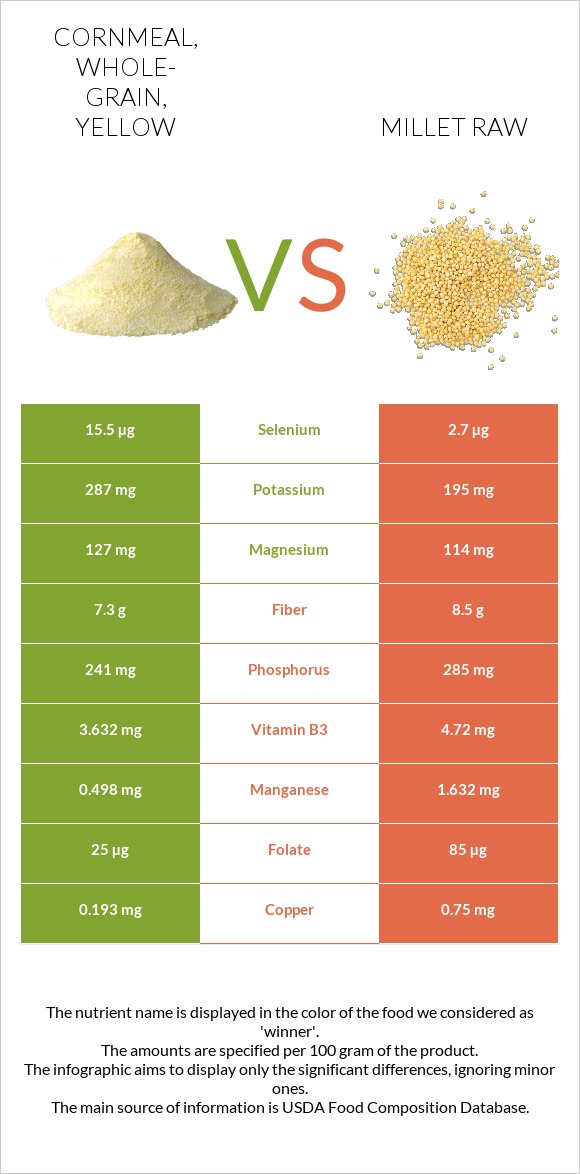Cornmeal, whole-grain, yellow vs. Millet raw — In-Depth Nutrition Comparison
Compare
Differences between cornmeal, whole-grain, yellow and millet raw
- Cornmeal, whole-grain, yellow is higher in selenium and iron; however, millet raw is richer in copper, manganese, folate, vitamin B5, vitamin B2, vitamin B3, phosphorus, and vitamin B6.
- Millet raw's daily need coverage for copper is 62% higher.
- Cornmeal, whole-grain, yellow has 6 times more selenium than millet raw. While cornmeal, whole-grain, yellow has 15.5µg of selenium, millet raw has only 2.7µg.
The food types used in this comparison are Cornmeal, whole-grain, yellow and Millet, raw.
Infographic

Infographic link
Mineral Comparison
Mineral comparison score is based on the number of minerals by which one or the other food is richer. The "coverage" charts below show how much of the daily needs can be covered by 300 grams of the food.
| Contains more MagnesiumMagnesium | +11.4% |
| Contains more PotassiumPotassium | +47.2% |
| Contains more IronIron | +14.6% |
| Contains more SeleniumSelenium | +474.1% |
| Contains more CalciumCalcium | +33.3% |
| Contains more CopperCopper | +288.6% |
| Contains more PhosphorusPhosphorus | +18.3% |
| Contains less SodiumSodium | -85.7% |
| Contains more ManganeseManganese | +227.7% |
Vitamin Comparison
Vitamin comparison score is based on the number of vitamins by which one or the other food is richer. The "coverage" charts below show how much of the daily needs can be covered by 300 grams of the food.
| Contains more Vitamin AVitamin A | +∞% |
| Contains more Vitamin EVitamin E | +740% |
| Contains more Vitamin B2Vitamin B2 | +44.3% |
| Contains more Vitamin B3Vitamin B3 | +30% |
| Contains more Vitamin B5Vitamin B5 | +99.5% |
| Contains more Vitamin B6Vitamin B6 | +26.3% |
| Contains more Vitamin KVitamin K | +200% |
| Contains more FolateFolate | +240% |
All nutrients comparison - raw data values
| Nutrient |  |
 |
DV% diff. |
| Copper | 0.193mg | 0.75mg | 62% |
| Manganese | 0.498mg | 1.632mg | 49% |
| Selenium | 15.5µg | 2.7µg | 23% |
| Folate | 25µg | 85µg | 15% |
| Vitamin B5 | 0.425mg | 0.848mg | 8% |
| Vitamin B2 | 0.201mg | 0.29mg | 7% |
| Vitamin B3 | 3.632mg | 4.72mg | 7% |
| Protein | 8.12g | 11.02g | 6% |
| Iron | 3.45mg | 3.01mg | 6% |
| Phosphorus | 241mg | 285mg | 6% |
| Vitamin B6 | 0.304mg | 0.384mg | 6% |
| Fiber | 7.3g | 8.5g | 5% |
| Choline | 21.6mg | 4% | |
| Magnesium | 127mg | 114mg | 3% |
| Potassium | 287mg | 195mg | 3% |
| Vitamin B1 | 0.385mg | 0.421mg | 3% |
| Polyunsaturated fat | 1.638g | 2.134g | 3% |
| Vitamin E | 0.42mg | 0.05mg | 2% |
| Calories | 362kcal | 378kcal | 1% |
| Fats | 3.59g | 4.22g | 1% |
| Carbs | 76.89g | 72.85g | 1% |
| Zinc | 1.82mg | 1.68mg | 1% |
| Sodium | 35mg | 5mg | 1% |
| Vitamin A | 11µg | 0µg | 1% |
| Vitamin K | 0.3µg | 0.9µg | 1% |
| Saturated fat | 0.505g | 0.723g | 1% |
| Net carbs | 69.59g | 64.35g | N/A |
| Calcium | 6mg | 8mg | 0% |
| Sugar | 0.64g | N/A | |
| Monounsaturated fat | 0.948g | 0.773g | 0% |
| Tryptophan | 0.057mg | 0.119mg | 0% |
| Threonine | 0.305mg | 0.353mg | 0% |
| Isoleucine | 0.291mg | 0.465mg | 0% |
| Leucine | 0.996mg | 1.4mg | 0% |
| Lysine | 0.228mg | 0.212mg | 0% |
| Methionine | 0.17mg | 0.221mg | 0% |
| Phenylalanine | 0.399mg | 0.58mg | 0% |
| Valine | 0.411mg | 0.578mg | 0% |
| Histidine | 0.248mg | 0.236mg | 0% |
Macronutrient Comparison
Macronutrient breakdown side-by-side comparison
Protein:
8.12 g
Fats:
3.59 g
Carbs:
76.89 g
Water:
10.26 g
Other:
1.14 g
Protein:
11.02 g
Fats:
4.22 g
Carbs:
72.85 g
Water:
8.67 g
Other:
3.24 g
| Contains more WaterWater | +18.3% |
| Contains more ProteinProtein | +35.7% |
| Contains more FatsFats | +17.5% |
| Contains more OtherOther | +184.2% |
~equal in
Carbs
~72.85g
Fat Type Comparison
Fat type breakdown side-by-side comparison
Saturated fat:
Sat. Fat
0.505 g
Monounsaturated fat:
Mono. Fat
0.948 g
Polyunsaturated fat:
Poly. Fat
1.638 g
Saturated fat:
Sat. Fat
0.723 g
Monounsaturated fat:
Mono. Fat
0.773 g
Polyunsaturated fat:
Poly. Fat
2.134 g
| Contains less Sat. FatSaturated fat | -30.2% |
| Contains more Mono. FatMonounsaturated fat | +22.6% |
| Contains more Poly. FatPolyunsaturated fat | +30.3% |